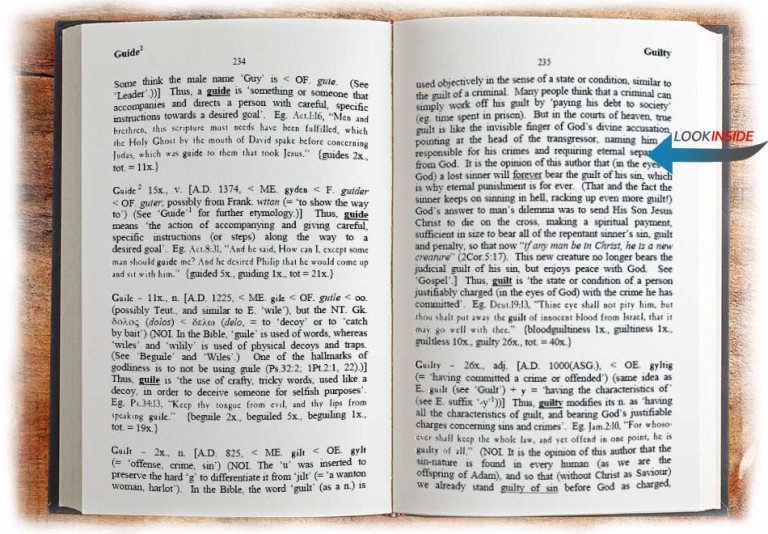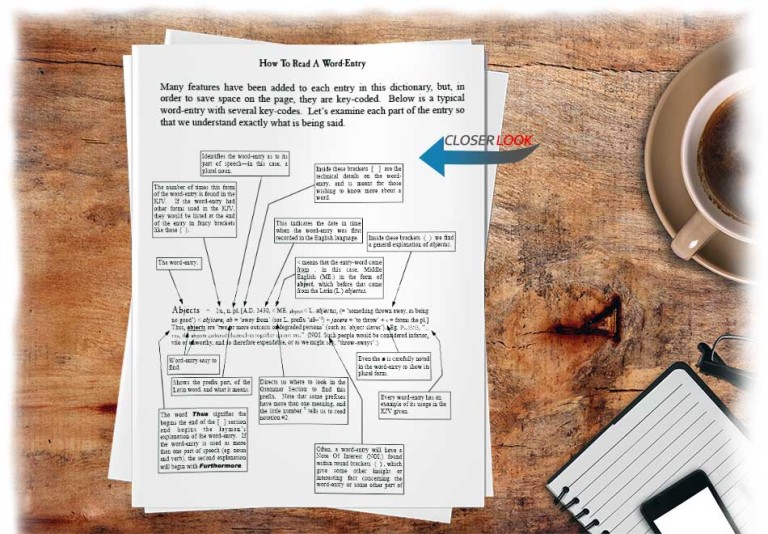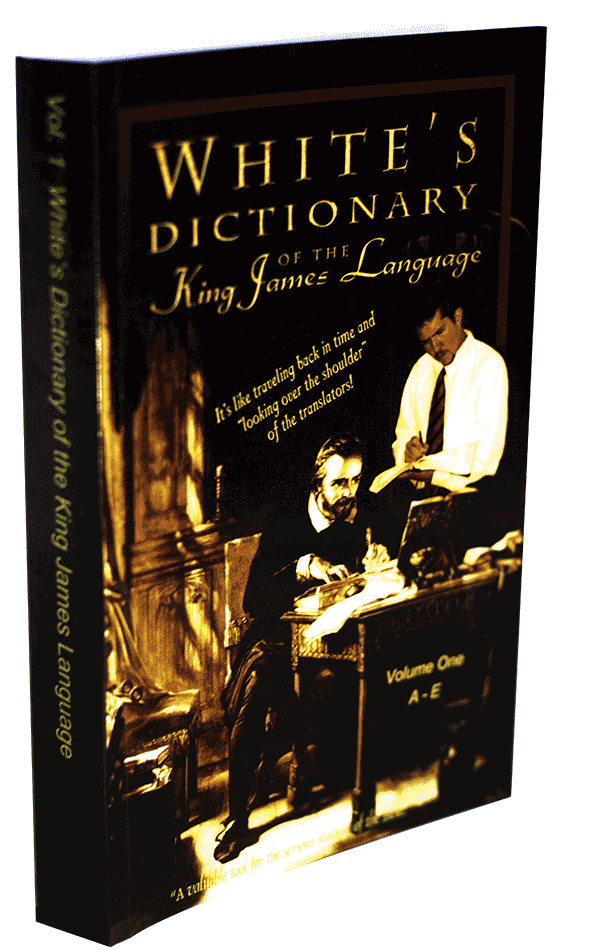White`s Dictionary of the King James Language is like traveling back in time and looking over the shoulder of the translators of our 1611 version. You will begin to understand the English Language of 1611 as never before! There is no other professional work like it on the market.
This handsome multi-volume set was designed for those who love to read and study the King James Bible. No Church, Bible School, Library or Christian home should be without a copy of White`s Dictionary of the King James Language.
What are the different meanings of:
- thou, thee, thine, thy?
- ye, you, your?
- me, my, mine?
Can you explain the difference between:
- example and ensample?
- alway and always?
- near and nigh?
It’s like traveling back in time and looking over the shoulder of the translators!
A valuable tool for the serious student of the Bible.
The Dictionary
How it works
With over 1500 words between volume 1 and 2, each entry begins with etymological data for deeper study, followed by bold, underlined key words for quick and easy reference for their meanings.
Word Origins
A table to give the reader a birds-eye-view of when each word-entry in this dictionary was first recorded in the English language. This information helps the reader to see the development of the English language all the way up to A.D. 1611.
Scriptures Used
This table is a valuable resource for those doing general research on Bible verses, listing all the Bible verses used in this dictionary, and cross referencing them with the word entry they are used in.
Primer on English Grammar
- Pronunciation of certain Old English (OE.) letters
- Symbols, abbreviations, and their definitions
- Eight basic parts of English Speech
Comparison of Early Versions of the Bible
A comparison of our modern King James Bible with several other earlier English Bibles (Wycliffe Bible of 1382, the Tyndale New Testament of 1526, and the Geneva Bible of 1550-1551).

How it works
With over 1500 words between volume 1 and 2, each entry begins with etymological data for deeper study, followed by bold, underlined key words for quick and easy reference for their meanings.
Scriptures Used
This table is a valuable resource for those doing general research on Bible verses, listing all the Bible verses used in this dictionary, and cross referencing them with the word entry they are used in.
Word Origins
A table to give the reader a birds-eye-view of when each word-entry in this dictionary was first recorded in the English language. This information helps the reader to see the development of the English language all the way up to A.D. 1611.

Primer on English Grammar
- Pronunciation of certain Old English (OE.) letters
- Symbols, abbreviations, and their definitions
- Eight basic parts of English Speech
Comparison of Early Versions of the Bible
A comparison of our modern King James Bible with several other earlier English Bibles (Wycliffe Bible of 1382, the Tyndale New Testament of 1526, and the Geneva Bible of 1550-1551).

Inside Volume One
(Letters A – E)
Personal Pronouns
A special section on the personal pronouns, ‘thee’, ‘thou’, ‘ye’, etc.
How?
How did we get our English language?
Who?
Who was King James?
How?
How did we get the King James Bible?
Serious Problems
Are there serious problems with the King James Bible?
A primer on English grammar
The eight basic parts of English speech and Punctuation

Inside Volume One
(Letters A – E)
Personal Pronouns
A special section on the personal pronouns, ‘thee’, ‘thou’, ‘ye’, etc.
How?
How did we get our English language?
Who?
Who was King James?
How?
How did we get the King James Bible?
Serious Problems
Are there serious problems with the King James Bible?
A primer on English grammar
The eight basic parts of English speech and Punctuation

Inside Volume Two
(Letters F – H)
Early Versions
Comparing Earlier Versions with the King James Version (KJV)
Wycliffe Bible
Comparing the Wycliffe Bible of 1382 with the KJV
Tyndale and Geneva
Comparing the Tyndale New Testament and the Geneva Bible of1550-1551 with the KJV
903 Differences
statistics — percentages and references
Grammar
Little More Grammar
Possessive
The Possessive ‘s and s’

Inside Volume Two
(Letters F – H)
Early Versions
Comparing Earlier Versions with the King James Version (KJV)
Wycliffe Bible
Comparing the Wycliffe Bible of 1382 with the KJV
Tyndale and Geneva
Comparing the Tyndale New Testament and the Geneva Bible of1550-1551 with the KJV
903 Differences
statistics — percentages and references
Grammar
Little More Grammar
Possessive
The Possessive ‘s and s’

Your dictionary brings to light more evidence of God’s hand upon the translators of the King James Bible.

Thank you for providing an in-depth language dictionary of the King James Bible. This has proven to be a tremendous tool in my studies.

Pastor Steven J. White
Steven J. White is a second generation Canadian, with his lineage from London, England. Born in 1956, he graduated from London Baptist Seminary (London, ON) in 1981, has started two churches and continues to pastor in Surrey, BC. Trained in English, French, Greek, Latin, Hebrew and American Sign Language, Pastor White brings a fresh, dynamic insight to many of the words found in the King James Bible.

Pastor Steven J. White
Steven J. White is a second generation Canadian, with his lineage from London, England. Born in 1956, he graduated from London Baptist Seminary (London, ON) in 1981, has started two churches and continues to pastor in Surrey, BC. Trained in English, French, Greek, Latin, Hebrew and American Sign Language, Pastor White brings a fresh, dynamic insight to many of the words found in the King James Bible.



